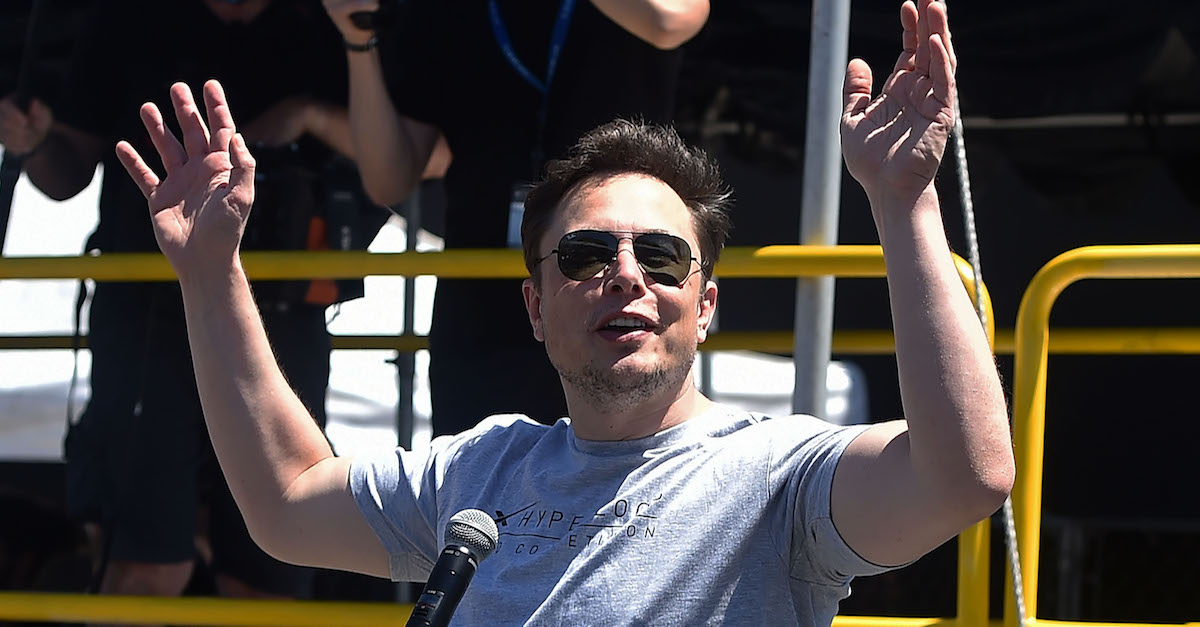
Tesla’s Elon Musk has made his case for why the defamation lawsuit against him should be dismissed, and it appears to be a strong one.
For some reason, Musk decided to call British man Vernon Unsworth, who volunteered to help rescue Thai children trapped in a cave, “pedo guy.” Musk did so on Twitter, after Unsworth criticized his efforts to help out, then deleted the tweets and blamed his “pedo” statement on “anger.” Unsworth, for his part, lawyered up and filed a defamation lawsuit against the loud-mouth billionaire.
Musk’s lawyers responded to that lawsuit Thursday with a motion to dismiss, and in one place cited judicial decisions about President Donald Trump‘s Twitter statements to bolster his case.
Team Musk began by explaining where the “anger” came from. They said Unsworth’s appearance on CNN, in which he “for reasons unknown, decided to pick a fight with Musk spectacularly public fashion,” was what initially set Musk off. Why? Because Unsworth was dismissing Musk and his and engineers’ own efforts to develop a way to save the Thai children.
Musk responded with the “pedo guy” insult and some baseless commentary about Unsworth having a “child bride who was about 12 years old.” Team Musk said that the lawsuit boils down to the question of whether a “reasonable reader [would] believe that Musk’s statements were supported by objective facts or were instead ‘nonactionable opinion.'”
In other words, in order for this to be considered defamatory the comments must be able to be reasonably construed as true (i.e. as objective fact). Musk’s lawyers said that was never the case, and Unsworth admitted as much when he said there was no evidence to support it.
“The public knew from the outset that Musk’s insults were not intended to be statements of fact; indeed many wondered aloud why Unsworth attacked Musk’s efforts in the first place. Unsworth himself claims that Musk was criticized for making accusations ‘without any evidence,'” they argued. “A statement is one of objective fact only if the reasonable reader would believe that the speaker possesses underlying information to support it.”
“Here, the reasonable reader would not have believed that Musk—without having ever met Unsworth, in the midst of a schoolyard spat on social media, and from 8,000 miles afar—was conveying that he was in possession of private knowledge that Unsworth was sexually attracted to children or engaged in sex acts with children,” they continued.
Instead, the lawyers called Musk’s attack “imaginative insults” protected by the First Amendment.
“Courts have consistently held imaginative insults—no matter how repugnant—are nonactionable so long as a reasonable reader would not believe them to be backed by objective fact,” they said. They contend that the internet is different, and reasonable users of the internet expect to encounter bullshit — “A statement made on an unmoderated internet forum therefore comes with a heavy thumb on the scale favoring opinion.”
Or put another way, “Twitter participants […] expect to read opinions, not facts,” since Twitter is a platform where users may say things that are not “pre-screened” by a moderator.
One example they cited was President Trump’s “rhetorical hyperbole” on Twitter. When porn star Stormy Daniels released a sketch of a man who allegedly threatened her, Trump reacted on Twitter by calling this a “total con job.”
However, U.S. District Judge S. James Otero dismissed the defamation suit Daniels filed against Trump over this statement. The judge said that Trump’s use of the insult “con job” to describe the sketch of “a nonexistent man” who Daniels claimed threatened her in a parking lot “appear[ed] to be rhetorical hyperbole by a public official involving a public figure,” as opposed to actual defamation.
“The reasonable reader of Musk’s statements would have known that they were mere ‘epithets, fiery rhetoric or hyperbole.’ Unsworth set the tone with a crass personal attack, telling Musk to ‘stick his submarine where it hurts,'” Musk’s lawyers argued in closing. “Unsworth attacked both Musk’s professional reputation and his personal motives for providing humanitarian aid. Musk fought fire with fire. He tweeted insults in direct response to Unsworth’s unflattering public comments—a point specifically pleaded by Unsworth.”
All of this is to say that when it comes to defamation, the legal standard is to prove that the statement in question could be or was taken as a statement of objective fact. That is, one must prove that a person was actually defamed. The argument that no one ever believed what Musk had to say in the first place, and for a variety of reasons, is a strong one.
Elon Musk’s argument ag… by on Scribd
[Image via Robyn Beck/AFP/Getty Images]
Have a tip we should know? [email protected]